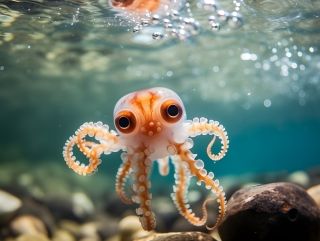Genetics
A Celestial Explanation for Cephalopods?
The evolution of the octopus may be too idiosyncratic to align with Darwinism.
Updated November 28, 2023 Reviewed by Lybi Ma
Key points
- Life on earth could have spawned from far-flung extraterrestrial origins.
- This life could have hitched a ride on icy comets that bombarded earth over billions of years.
- The rapid emergence of octopi defies Darwinian evolution, per researchers.

A fascinating hypothesis has recently resurfaced that octopuses are alien life forms. However unlikely it may sound, this idea is rooted in actual science. Specifically, space-resistant bacteria, viruses, eukaryotic cells, and so forth seeded the earth and facilitated terrestrial evolution that eventually led to the emergence of mankind.
In 2018, a peer-reviewed article authored by a number of high-profile international researchers posited that icy, virus-bearing comets continually bombarded the earth starting more than 4 billion years ago and contributed to the ineffable genetic diversity observed on our planet. Among the products of extreme extinction-diversification events are cephalopods like the octopus. To bolster this hypothesis, the authors point to micro-organism fossil evidence found in meteorites and the presence of incoming life-bearing particles from space.
“Evidence of the role of extraterrestrial viruses in affecting terrestrial evolution has recently been plausibly implied in the gene and transcriptome sequencing of Cephalopods. The genome of the octopus shows a staggering level of complexity with 33,000 protein-coding genes more than is present in Homo sapiens,” the authors wrote in Progress in Biophysics and Molecular Biology.
Here are a few of the arguments the authors make to support their hypothesis.
First, the octopus’s camera-like eyes, large brain and complex nervous system, flexible bodies, instantaneous camouflage via the ability to switch color, and shape-shifting abilities evolved inexplicably quickly.
Second, transformative genes leading from a cuttlefish common ancestor to squid to the common octopus are not readily identifiable in any other life form and could come from some distant future.
Third, a large qualitative transition in A-to-I mRNA editing in squid and octopuses cannot be explained by conventional neo-Darwinian processes—even if secondary to horizontal gene transfer.
“One plausible explanation, in our view, is that the new genes are likely new extraterrestrial imports to Earth—most plausibly as an already coherent group of functioning genes within (say) cryopreserved and matrix-protected fertilized octopus eggs,” the authors wrote.
Overall, the investigators suggest that the new genes in the octopus could not have been derived only from horizontal gene transfers, simple random mutations of extant genes, or duplicative expansions, and instead, these genes hitched a ride on ice-bearing comets and in their debris.
Nevertheless, they conceded that “Cosmic Gene Pools” may be too reductive in diminishing the role of Darwinian evolution.
Something to give you pause the next time you see octopus on the menu.


